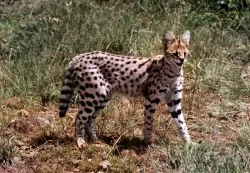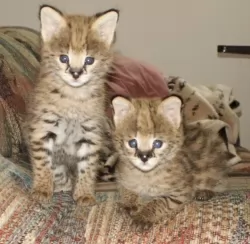 MyCatBreeds
MyCatBreeds The African Serval is a wild cat that hails from Africa. You’ll see them on Africa’s savannas where there is tall grass and reeds, preferably near water.
The African Serval is a wild cat that hails from Africa. You’ll see them on Africa’s savannas where there is tall grass and reeds, preferably near water.
If you want to own a serval cat, you have to check whether you require licenses and permits as they are particularly difficult to rehome once you have owned one. Humans have kept them since ancient times, but they are not domesticated cats as such.
Breeding servals arrived in the United States many decades ago. Breeders have also crossed serval cats with domestic cats to produce hybrids, one of which is the Savannah cat.
 The Serval is a medium to large-sized cat that stands at between 54–62 cm in height and weighs in the region of 9–18 kg.
The Serval is a medium to large-sized cat that stands at between 54–62 cm in height and weighs in the region of 9–18 kg.
Some people think its a cat that looks similar to a Cheetah and this is because it also has a small head. It is known for its large ears which are black at the back with a large white dot. The attractively patterned coat is both spotted and striped with black against a golden/tawny shade.
These wild cats make a number of different noises - high pitched cries to growls, spitting sounds and purring. Another well-known feature with the cat is its particularly long legs. The tail has some black rings and it is black-tipped. The eyes of the Serval are a brown/greeny color.
The Serval cats will only come together for mating and then they resume their solitary lives. Gestation lasts for roughly 73 days after which up to 6 kittens can be born. In captivity, a Serval can live to be about 20 years of age.
The Serval is an active cat night and day. They are solitary animals not known for strong social interactions with humans but they can be playful with the few humans he gets to know.
People need to always know that owning a wild pet like this comes with risks. Not only that, a Serval wants to mark its territory and while you may provide a litter box, it's not to say he will use it.
They are able to bond with humans to some extent, more so if they were hand-fed from early on. They bond with one person and can form an affectionate relationship with that one person.
 The African Serval is a wild animal and should be left in the wild.
The African Serval is a wild animal and should be left in the wild.
However, if you do decide to bring one into your home as a pet, they aren’t recommended for homes with young children or for a first-time pet owner.
Their play is rough and they like to use their teeth and claws during play. If the child gets hurt, then in typical unfair human fashion, the Serval is the one who suffers. They are capable of making good pets though but it is not recommended.
 Make sure that before you take in a Serval as a pet you have access to a good veterinarian who is experienced in helping exotic pets.
Make sure that before you take in a Serval as a pet you have access to a good veterinarian who is experienced in helping exotic pets.
Also, the African Serval, when domesticated, will need the same cat vaccines that you would give your regular kitten.
 The Serval is a wild cat so in the wilds it eats prey such as frogs, birds and reptiles. They are known for leaping high into the air to catch prey but they will also burrow into holes to get prey out.
The Serval is a wild cat so in the wilds it eats prey such as frogs, birds and reptiles. They are known for leaping high into the air to catch prey but they will also burrow into holes to get prey out.
You should try to provide your Serval pet with some whole prey. Do research on the food of Servals because you will need to offer your wild pet a feline supplement. There are also formulated pelleted food, but this shouldn’t form the bulk of his food but rather be a supplement to his meats. Choose a variety of meats such as chicken, mice, turkey, beef, duck as well as rabbits and birds.
If you keep a serval, it is imperative that it has large outdoor areas to roam in. They’re nocturnal animals, so they become more active at night. They’re used to living near streams in the wild so some kind of pool will be required for him, possibly even a fish pond where he can catch his own fish.